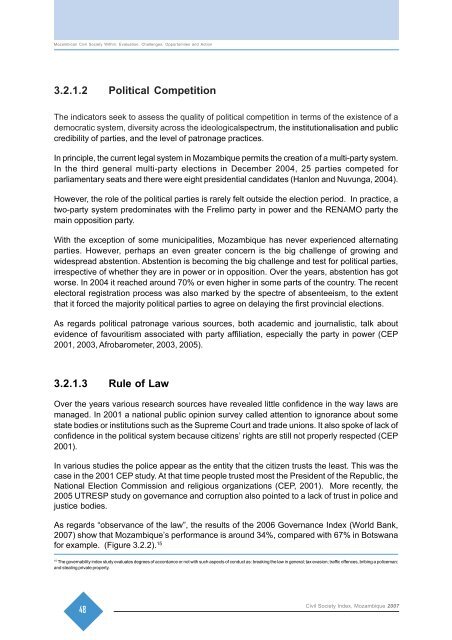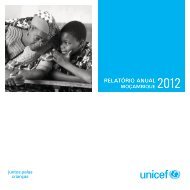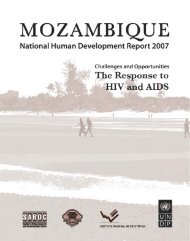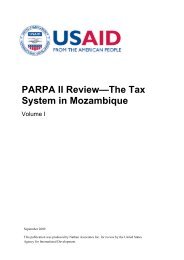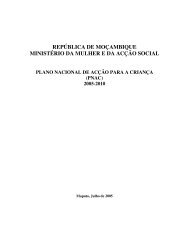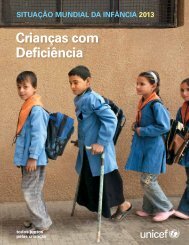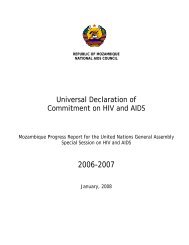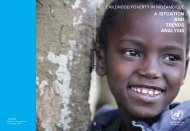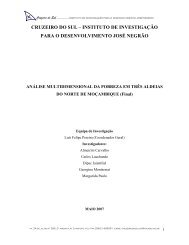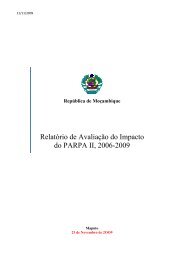Mozambican Civil Society Within: - UNICEF Mozambique - Home page
Mozambican Civil Society Within: - UNICEF Mozambique - Home page
Mozambican Civil Society Within: - UNICEF Mozambique - Home page
You also want an ePaper? Increase the reach of your titles
YUMPU automatically turns print PDFs into web optimized ePapers that Google loves.
<strong>Mozambican</strong> <strong>Civil</strong> <strong>Society</strong> <strong>Within</strong>: Evaluation, Challenges, Opportunities and Action<br />
3.2.1.2 Political Competition<br />
The indicators seek to assess the quality of political competition in terms of the existence of a<br />
democratic system, diversity across the ideologicalspectrum, the institutionalisation and public<br />
credibility of parties, and the level of patronage practices.<br />
In principle, the current legal system in <strong>Mozambique</strong> permits the creation of a multi-party system.<br />
In the third general multi-party elections in December 2004, 25 parties competed for<br />
parliamentary seats and there were eight presidential candidates (Hanlon and Nuvunga, 2004).<br />
However, the role of the political parties is rarely felt outside the election period. In practice, a<br />
two-party system predominates with the Frelimo party in power and the RENAMO party the<br />
main opposition party.<br />
With the exception of some municipalities, <strong>Mozambique</strong> has never experienced alternating<br />
parties. However, perhaps an even greater concern is the big challenge of growing and<br />
widespread abstention. Abstention is becoming the big challenge and test for political parties,<br />
irrespective of whether they are in power or in opposition. Over the years, abstention has got<br />
worse. In 2004 it reached around 70% or even higher in some parts of the country. The recent<br />
electoral registration process was also marked by the spectre of absenteeism, to the extent<br />
that it forced the majority political parties to agree on delaying the first provincial elections.<br />
As regards political patronage various sources, both academic and journalistic, talk about<br />
evidence of favouritism associated with party affiliation, especially the party in power (CEP<br />
2001, 2003, Afrobarometer, 2003, 2005).<br />
3.2.1.3 Rule of Law<br />
Over the years various research sources have revealed little confidence in the way laws are<br />
managed. In 2001 a national public opinion survey called attention to ignorance about some<br />
state bodies or institutions such as the Supreme Court and trade unions. It also spoke of lack of<br />
confidence in the political system because citizens’ rights are still not properly respected (CEP<br />
2001).<br />
In various studies the police appear as the entity that the citizen trusts the least. This was the<br />
case in the 2001 CEP study. At that time people trusted most the President of the Republic, the<br />
National Election Commission and religious organizations (CEP, 2001). More recently, the<br />
2005 UTRESP study on governance and corruption also pointed to a lack of trust in police and<br />
justice bodies.<br />
As regards “observance of the law”, the results of the 2006 Governance Index (World Bank,<br />
2007) show that <strong>Mozambique</strong>’s performance is around 34%, compared with 67% in Botswana<br />
for example. (Figure 3.2.2). 15<br />
15<br />
The governability index study evaluates degrees of accordance or not with such aspects of conduct as: breaking the law in general; tax evasion; traffic offences, bribing a policeman;<br />
and stealing private property.<br />
48<br />
<strong>Civil</strong> <strong>Society</strong> Index, <strong>Mozambique</strong> 2007


